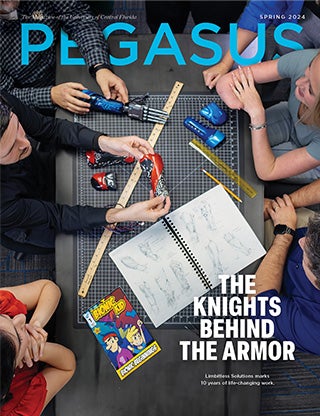In hopes of equipping students to better understand and assist families facing domestic violence, UCF has joined the network of universities administering Survivor Link.
The network provides students pursuing a with training, networking opportunities, scholarships and field placements in community nonprofits. As they develop their expertise, they also train their colleagues in domestic violence response.
The program, which began in 2015 at Arizona State University, is now a National AmeriCorps Public Health Program. So far, it’s trained 445 students as domestic violence advocates and awarded more than $1.2 million in scholarships. Come fall, UCF will be one of 14 participating universities in 11 states.
“I love Survivor Link because it’s true to the nature of the field,” says Bethany Backes, an assistant professor of and , and one of three UCF liaisons for the program. “Social work is amazing for how interdisciplinary it is. We’re embedded in so many systems — criminal justice, child welfare, healthcare, military and more. Social workers play such a large role at all levels of our community and within institutional and systemic infrastructures. The program is a great opportunity for students to see this and understand that violence isn’t an issue limited to a single discipline — it’s so much larger than any one field.”
Assistant Professor of Julia O’Connor and Program Director for Robin Pisiano are the other liaisons. Backes and O’Connor are also members of the Violence Against Women Cluster.
According to its site, the cluster conducts interdisciplinary research to “guide policymaking designed to reduce the experience and impact of violence toward women.” Domestic violence is a necessary focus, for how prevalent yet hidden it can be. In the U.S., about 1 in 4 women and 1 in 10 men report some type of intimate partner violence during their lifetime, according to the Centers for Disease Control and Prevention’s 2015 National Intimate Partner and Sexual Violence Survey.
Backes says experience has taught her that when tackling an issue as huge as domestic violence, “you don’t want to look at it all from a single lens.”
For this reason, Backes strives to make the most of social work’s interdisciplinary potential. She works on a range of projects in addition to Survivor Link — including studies on justice reform and the impact of transitional housing on families exiting domestic violence situations. She is also collaborating with UCF’s to develop a screening tool for interpersonal and intimate partner violence.
Students participating in Survivor Link are also encouraged to embrace social work’s interdisciplinarity. They can do their field placements in a variety of health-focused agencies, and have the opportunity to gain research experience under the supervision of one of the program liaisons.
“The goal is to build knowledge about domestic violence — then, that knowledge can be infused into interventions for survivors at the community and individual level,” says Backes.
For more information or to be considered for the program, contact Bethany Backes at Bethany.Backes@ucf.edu





